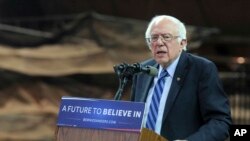Bernie Sanders' entry into the 2020 presidential race has complicated fellow liberal Elizabeth Warren's bid for the Democratic nomination, a path that runs straight through New Hampshire.
Sanders, a U.S. senator from neighboring Vermont, retains a strong following in the state where he trounced Hillary Clinton by more than 20 percentage points in the 2016 presidential contest.
An Emerson College opinion poll of New Hampshire voters released on Saturday showed Sanders to be the top choice of respondents with 27 percent of the vote. Warren, a senator from neighboring Massachusetts, was far behind at 9 percent — a worrisome number given many New Hampshire voters are familiar with her.
But as Warren, 69, returned to the early voting state over the weekend for the second time this month, there were signs she could be chipping away at Sanders' support a year before the New Hampshire primary election.
Some New Hampshire residents who voted for Sanders last time told Reuters they now were leaning toward Warren. Some said the 77-year-old Sanders' political window had closed. Others said they wanted to see a female nominee.
"Bernie lost his shine," said Candace Moulton, 36, who attended Warren's campaign event in Manchester, New Hampshire. "I think we're really ready to have a woman president, to be frank."
New Hampshire often has been where presidential aspirations are solidified. While the Iowa caucuses serve as the first test of a candidate's strength, New Hampshire holds the first party primary, and has been a state where a contender can build momentum, salvage a campaign or reach the end of the road.
Ten Democrats have already declared their candidacy for the party's nomination, and more are expected to join the contest. The winner will likely face Republican President Donald Trump in the general election in November 2020.
New Hampshire's primary traditionally has favored candidates with ties to the region, making it important for Sanders and Warren to target. Both are progressives with similar policy platforms that include providing universal health care coverage and raising the minimum wage.
Dante Scala, a professor of political science at the University of New Hampshire, said he expects the presidential field to narrow significantly by the time the primary comes.
"There's a good likelihood that New Hampshire will be framed as a Sanders-Warren competition with one ticket out," he said. Should Warren fail to win Iowa, New Hampshire becomes a "must-win," Scala said. "It's hard to see her lasting if she can't win here."
Former Vice President Joe Biden could muddy things further if he mounts a bid. Biden placed second in the Emerson poll, and his high name recognition with voters could give him a boost.
Friendly territory
Warren campaigned in New Hampshire as if she were a local. "You guys know me," she told a gathering of 1,000 state party leaders and activists in Manchester on Friday. She followed up by speaking to a full hall in Plymouth on Saturday.
On this swing, Warren played up her personal story over policy, talking about her family's struggles growing up in Oklahoma and the challenges she faced as a young mother.
After the Plymouth event, Nancy Chandler, 84, said Warren won her support with a fiery speech where she talked about wanting "big, systemic change" and fighting for the middle class.
"I think the bus has passed," Chandler of Warren, New Hampshire, said of Sanders.
Liz Alcauskas, 74, of Manchester, said many of Sanders' ideas were important, but she planned to vote for a different Democrat in next year's election.
"I would like to not have an old, white man be president," she said. "It's someone else's turn now."
Even some of Sanders' most loyal supporters are unsure of him this time. Andru Volinsky, a member of Sanders's 2016 steering committee in the state, said "my first inclination is towards Bernie, but I haven't ruled out a handful of others."
The home-field advantage enjoyed by Sanders and Warren has sparked speculation that other candidates may compete less intensely in New Hampshire, focusing instead on other early states.
Senator Kamala Harris of California made her first campaign trip to the state earlier this month and insisted she would be an active presence there. But she had made a point of visiting South Carolina, with its large swath of African-American voters, before New Hampshire.
Harris likely will also concentrate on gaining the majority of support from the millions of voters in her home state, which has its primary in early March but will allow early voting to begin around the time of the New Hampshire contest.
Raymond Buckley, chairman of the New Hampshire Democratic Party, said other candidates cannot afford to write the state off.
"In 2020, we have such an immensely diverse group of candidates, in every sense of the word, that it's dangerous to make any assumptions about how the primary will turn out," Buckley said.
There remains room in the state for Warren's support to grow. Her Plymouth event was filled with undecided voters.
"I feel very wide open right now. I feel like I could support anyone," said A.J. Coppola, 32, from Thornton, New Hampshire. "I'm inclined to the person who is really passionate, who feels like they have energy behind them."


























